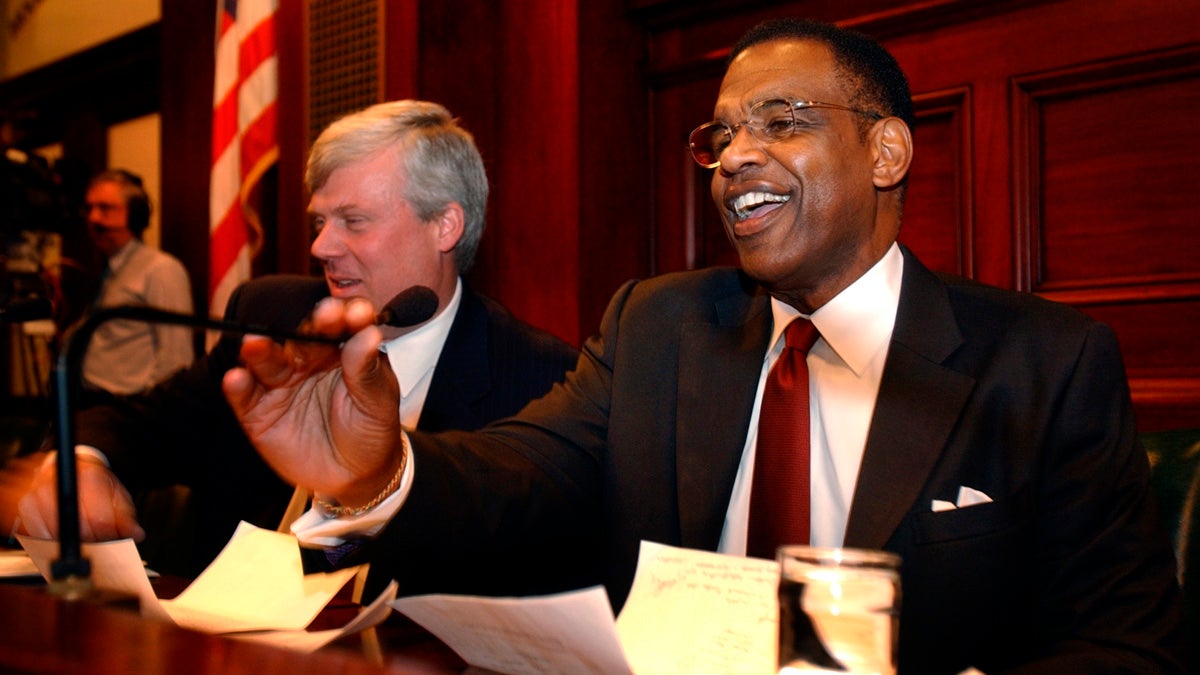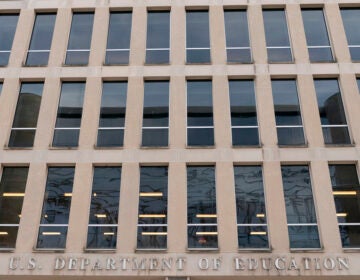Chester-Upland gets veteran superintendent as interim receiver

Francis Barnes, right, prepares to answer questions moments before his confirmation hearing as Pennsylvania's education secretary in 2004. Barnes has been appointed receiver of the troubled Chester-Upland School District. (AP file photo)
Francis V. Barnes has had contact with the long-troubled Chester-Upland School District, located in Delaware County, for more than a decade.
“When I was secretary of education [for the Rendell administration], we used to meet on Chester-Upland regularly,” said Barnes. “That was from 2004 to 2005.”
Barnes has had the opportunity to revisit the district recently, first as chief recovery officer and now as interim receiver.
Both positions exist through clauses in Pennsylvania’s legal code allowing the state to intervene — to varying degrees — in districts deemed “distressed.” In some cases of “distress,” a receiver essentially takes over most of the decision-making capacities of a local school board.
Chester-Upland has had some form of state oversight for more than two decades, but its academic performance consistently ranks among the lowest in Pennsylvania.
This week, Court of Common Pleas President Judge Chad F. Kenney granted the state Department of Education’s request to put Barnes in the role of interim receiver for 90 days, after Joseph Watkins left the post to work for a social media firm.
Watkins, appointed by Gov. Tom Corbett in 2012, attempted some unorthodox initiatives for turning Chester-Upland around. He tried partnering with a Chinese businessman to bring in a $1 billion investment in the district (that idea didn’t float with the state), and he offered charter school students headphones and laptops to return to district-run schools.
Barnes, who will temporarily vacate his role as chief recovery officer to step in as receiver, would not comment on the performance of his predecessor. The state tried to oust Watkins in favor of Barnes back in 2014, but the two ended up working together after Kenney ruled the state could not “break up the team.”
Barnes said he’ll be working on the nuts and bolts of brushing up school buildings over the summer, as well as steering Chester-Upland through a summer of funding uncertainty.
There’s a completely grant-funded out-of-school time program to run, as well as HVAC systems to repair in some of the schools, according to Barnes. And a $24 million budget deficit looms, with no certainty of relief from Harrisburg.
That “fiscal crisis” is twofold, said Barnes. “There’s one which involves a structural deficit … and I have no solution to that.”
The other is the absence of a state budget. Even with the largest infusion of state cash on the table — the budget proposed by Gov. Tom Wolf — Chester-Upland would receive only an additional $8.64 million next year.
“We’re seeking to keep the schools open and pay bills until there is a budget and government to be able to receive new subsidies,” said Barnes.
However, he said, just adding more money “would not get us out of the hole.”
“There needs to be somebody that actually looks and studies the situation in Chester-Upland and analyzes to see how the hole is increased by the way the funding of charter schools is legislated,” he said.
Under Corbett, Pennsylvania eliminated charter reimbursement funding from its budget. That money helped defray some of the costs incurred by districts when students leave for charter schools. Districts with a lot of students in charter schools, such as Chester-Upland and Philadelphia, were hit especially hard by that funding cut.
According to the state’s performance database, Chester-Upland had 4,224 charter students in the 2013-2014 school year and 2,985 students in district-run schools.
Barnes, who said legislators are aware of what charter policy does to districts such as Chester-Upland, said the failure to fix it is a “moral problem.”
“The extent that kids suffer because of their ZIP code and don’t receive adequate funding for education because of where they go to school, I believe, is a moral issue,” he said.
According to a Department of Education spokesman, Barnes has to relinquish his post as chief recovery officer while appointed to the receivership, “because they would be in conflict with each other.”
As receiver, he will continue to work with the district to amend a three-year recovery plan for the district’s finances and academic performance, which is due in October.
Barnes said whether he would seek to keep the post of receiver past the 90-day appointment is “to be determined.”
WHYY is your source for fact-based, in-depth journalism and information. As a nonprofit organization, we rely on financial support from readers like you. Please give today.




